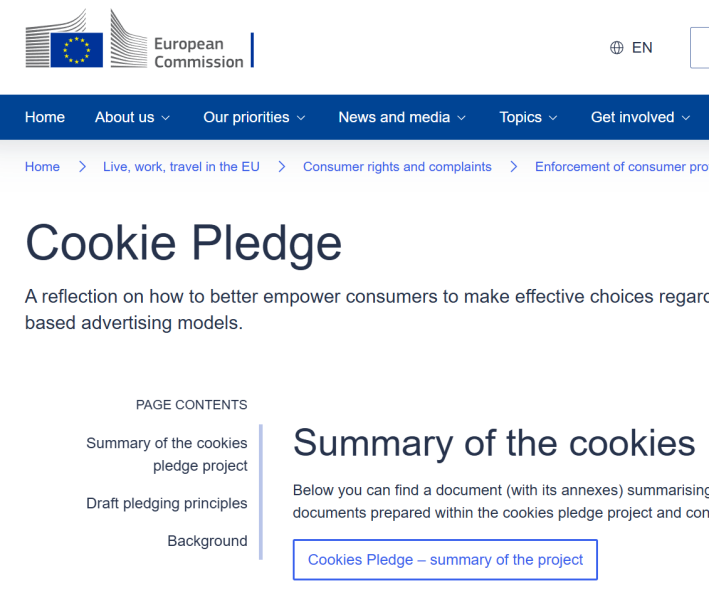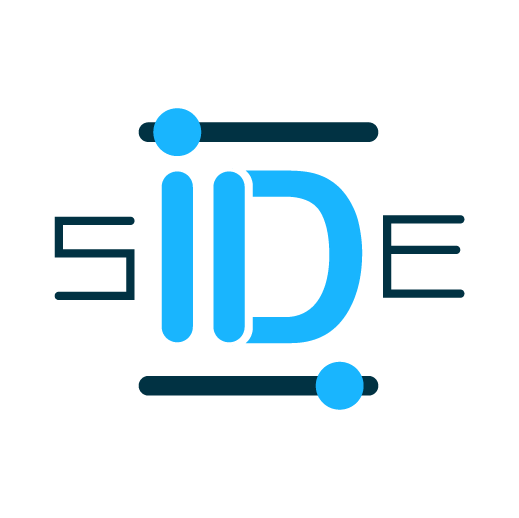ID side contribution to EU Commission
4 Apr 2024

Cookie Pledge Initiative
From April to December 2023, the EU Commission ran targeted and closed-doors consultations with a set of stakeholders interested in behavioral advertising, cookie banners, and tracking online. Indeed, "during the European Consumer Summit of March 2023, Commissioner Reynders launched the so-called “cookies pledge” project. Under this initiative, the Commission services worked together with stakeholders on voluntary business solutions to better empower consumers in the data economy, in particular in relation to the personalization of advertising and personal data sharing. This project was named the 'cookies pledge' to indicate its voluntary nature, even though it was only an exploratory and participatory work strand."
The project objective is to help reduce the need for consumers to constantly accept or reject cookies and other trackers (the source of the so-called “cookie fatigue”) in the first place. "The initiative was also meant to provide consumers with clear information and better understanding of the business model of the company behind the website/app they use and to empower consumers to choose the advertising model fitting best their privacy preferences."
From October to December 2023, ID side actively contributed to the EU Commission Cookie Pledge Initiative and notably the drafting and adoption of high-level principle H proposed by EU Commission (DG Connect) for the pledge. Principle H lays down that:
"Signals from applications providing consumers with the possibility to record their cookie preferences in advance with at least the same principles as described above will be accepted.
Consumers should have their say if they decide that they want to systematically refuse certain types of advertising models. They should be empowered to do this, and privacy and data protection legislation should not be used as an argument against such a choice provided the automated choice has been made consciously."
More than 5 years after CCPA did so in the US, the EU Commission acknowledged the added value of providing individuals with automated Privacy signals' tools. In its opinion on the cookie Pledge, the EDPB also "recognises the abilities of software applications to empower users to protect their terminal equipment" and "encourages the employment of data protection by default or design in such applications", also stressing it "believes that a pledge to respect the signals/settings expressing a user’s refusal, and to not still ask users for consent, could help to reduce cookie fatigue.
From April to December 2023, the EU Commission ran targeted and closed-doors consultations with a set of stakeholders interested in behavioral advertising, cookie banners, and tracking online. Indeed, "during the European Consumer Summit of March 2023, Commissioner Reynders launched the so-called “cookies pledge” project. Under this initiative, the Commission services worked together with stakeholders on voluntary business solutions to better empower consumers in the data economy, in particular in relation to the personalization of advertising and personal data sharing. This project was named the 'cookies pledge' to indicate its voluntary nature, even though it was only an exploratory and participatory work strand."
The project objective is to help reduce the need for consumers to constantly accept or reject cookies and other trackers (the source of the so-called “cookie fatigue”) in the first place. "The initiative was also meant to provide consumers with clear information and better understanding of the business model of the company behind the website/app they use and to empower consumers to choose the advertising model fitting best their privacy preferences."
From October to December 2023, ID side actively contributed to the EU Commission Cookie Pledge Initiative and notably the drafting and adoption of high-level principle H proposed by EU Commission (DG Connect) for the pledge. Principle H lays down that:
"Signals from applications providing consumers with the possibility to record their cookie preferences in advance with at least the same principles as described above will be accepted.
Consumers should have their say if they decide that they want to systematically refuse certain types of advertising models. They should be empowered to do this, and privacy and data protection legislation should not be used as an argument against such a choice provided the automated choice has been made consciously."
More than 5 years after CCPA did so in the US, the EU Commission acknowledged the added value of providing individuals with automated Privacy signals' tools. In its opinion on the cookie Pledge, the EDPB also "recognises the abilities of software applications to empower users to protect their terminal equipment" and "encourages the employment of data protection by default or design in such applications", also stressing it "believes that a pledge to respect the signals/settings expressing a user’s refusal, and to not still ask users for consent, could help to reduce cookie fatigue.
